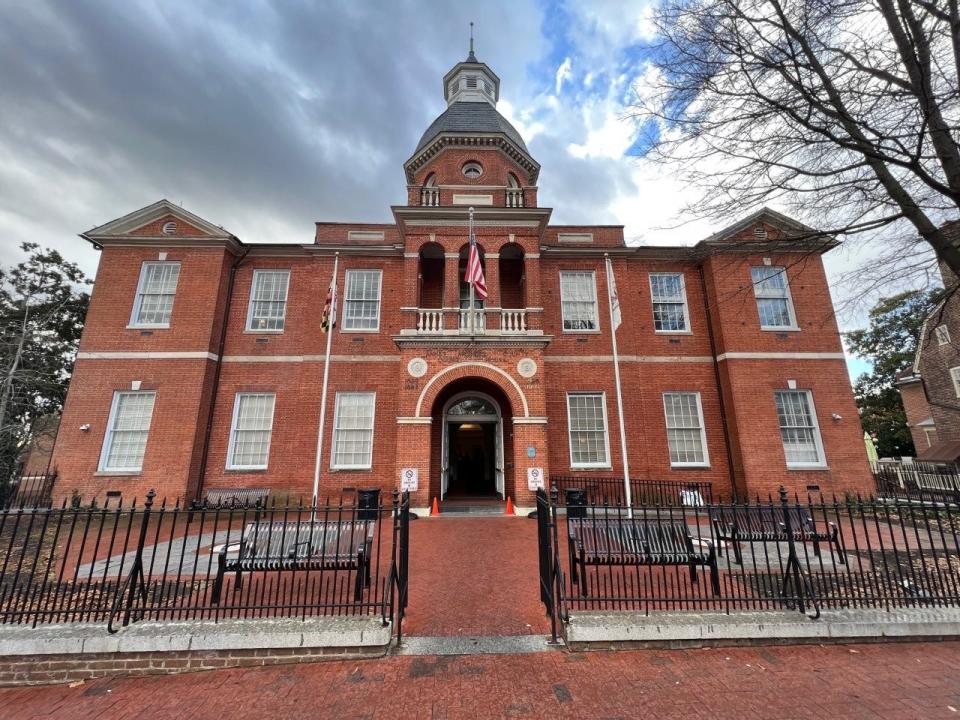As Tax Day nears, future of digital ad tax, designed to fund schools, remains uncertain
Earlier this month, the Maryland Senate shifted $300 million intended by the governor for transportation to the state’s schools. The funds fill a gap left as large, lucrative technology companies litigate a law that taxes their digital advertisements — revenue meant to partially pay for the state’s education plan.
Senate President Bill Ferguson, D-Baltimore City, tied the law in question, which he has deemed a tax on “big tech” companies, to funding for the state’s education system again this week.
“I again remain committed to this objective,” said Ferguson, a former teacher, during a March 28 press conference in the Senate lounge. “Major platforms that benefit from the long-term education of people should be contributing to that education system.”

More: Digital ad tax was meant to fund schools. A Maryland court tossed it. What's next?
Comptroller collected millions from tax during last fiscal year
The state’s comptroller collected about $54 million for the education fund from the digital ad tax during just one quarter of last fiscal year, according to a policy analyst at the Department of Legislative Services, during a November fiscal meeting. Last month, the office of the state’s new comptroller posted online an alert and form to collect the tax again from companies with global annual gross revenues of $100 million or more.
As points of reference, Meta, formerly known as Facebook Inc. and the owner of Instagram, made about $85 billion in global revenue in 2021; Alphabet, the parent company of Google, made more than twice that much in 2021, with at least 80 percent coming from displaying ads. Maryland law requires companies to pay a portion of tax from digital advertising services estimated to have occurred in the state.
“For tax year 2022, the Digital Advertising Gross Revenues tax return and payment is due April 17, 2023,” said Adam Abadir, director of strategic communications for the comptroller, in a statement. The date comes one day before federal Tax Day this year on Tuesday, April 18.
More: All Maryland counties turn in school plan. Approval, tied to funding, awaits
Case from Anne Arundel County heads to state Supreme Court
Meanwhile, questions about the tax law, struck down by an Anne Arundel Circuit Court judge last October as unconstitutional, are scheduled to be heard again — this time at the Supreme Court of Maryland on Friday, May 5.
A separate federal case on the tax has been heard, and could again become a “justiciable controversy,” according to the December opinion of a United States district judge, depending on the outcome of the state case.
Jeffrey Friedman, lead counsel for plaintiffs Comcast and Verizon, did not comment on the active state case, per his firm’s policy. He is a partner at Eversheds Sutherland LLP in Washington, D.C.
Brooke Lierman, elected as comptroller in November, inherited the role as defendant in the case from the previous comptroller, Peter Franchot, who served as the state’s tax collector for 16 years. Julia Doyle Bernhardt, in the office of state’s Attorney General Anthony Brown (also elected in November), is set to represent the state in the case at the May 5 oral argument.

“Maryland is the first state in the country to introduce legislation imposing a tax on digital advertising,” according to the original fiscal note for the legislation. The note also mentions that France and Hungary have implemented such a tax, though the latter European nation has a zero percent digital ad tax rate for the rest of the year.
The legislative leader who helped to pass the Maryland law indicated that revenue from the tax this year was not likely — though he expressed confidence in prevailing in the cases’ final outcome.
“We always knew this would be subject to litigation,” said Ferguson, from the state capital. “Here it is.”
The name of the state case is Comptroller of Maryland v. Comcast of California/Maryland/Pennsylvania/Virginia/West Virginia, LLC, et al., No. C-02-CV-21-000509.
Dwight A. Weingarten is an investigative reporter, covering the Maryland State House and state issues. He can be reached at dweingarten@gannett.com or on Twitter at @DwightWeingart2.
This article originally appeared on The Herald-Mail: Court date set for digital ad tax, designed to fund Maryland schools

